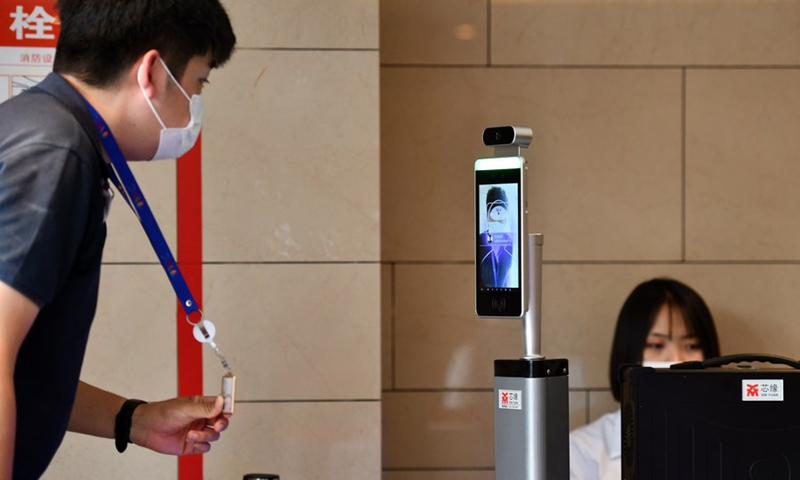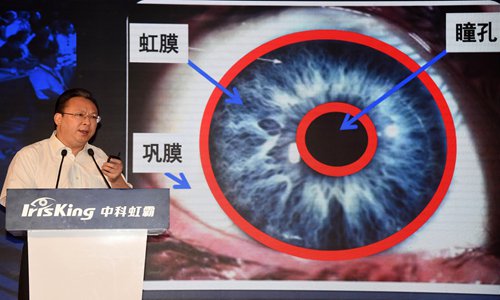Experts propose iris recognition system to resolve face ID problems amid pandemic
By By Deng Xiaoci Source: Published: 2020/7/2 0:54:20

A man wearing a mask uses a facial recognition device before entering the fourth World Intelligence Congress in north China's Tianjin, June 23, 2020. (Xinhua/Li Ran)
As wearing facial masks has become the new normal in people's daily lives amid the COVID-19 pandemic, face recognition applications, including its most common use of unlocking mobile phones, have met serious challenges, which in turn could accelerate and promote the wider use of iris recognition technology, according to Chinese experts and industry leaders on Wednesday.
Human iris is one of the most unique biometric characteristics of a human body and it is stable during life, which could be processed as ways to accurately identify phone users and determine if they have access to the terminals, Sun Zhenan, a fellow researcher and iris recognition technology expert with the Institute of Automation under the Chinese Academy of Sciences (CAS,) told the Global Times on Wednesday.
Iris recognition could resolve technical barriers when face identification is unavailable, as user's faces are mostly covered by masks, he noted.
Iris recognition is more accurate and harder to be counterfeited than face recognition, whereas identification data of fingerprints are prone to wear and tear and its collection process involving physical touch could also add to infection risks, Ma Li, general manager of IrisKing, a Beijing-based company under the CAS Institute of Automation, told the Global Times on Wednesday, explaining the unique merits of the iris technology.
A database containing the biometric iris information of up to 20 million people has also been developed in China, as part of the iris recognition system and platform built by the Beijing Municipal Public Security Bureau and IrisKing, Global Times previously reported.
An employee with the Beijing firm told the Global Times on Wednesday that the database is mainly used to confirm the identification of people for public security purposes and declined to disclose further details.
The reason why iris recognition technology is not as commonly used as face identification is that the collection process is more complex and therefore less convenient for users. But mounting a small-sized iris imaging device on a mobile phone is very simple, another Beijing-based expert who requested anonymity told the Global Times on Wednesday.
According to Sun, Chinese researchers have been exploring effective ways to acquire and recognize iris images since the 1990s, and accumulated rich theories and methodologies over the past two decades.
A security management and monitoring platform based on iris recognition has been widely applied in the country's major mining companies, including the state-owned China Coal, taking up more than 80 percent of the market share.
Also, the iris recognition has also been supporting dozens of fields including mobile unlock, time and attendance, e-payment, finance and stock exchange, access control, education, as well as information security, Sun said.
Domestic application of the iris recognition technology is mostly homegrown, said the CAS researcher, and he noted that "China has developed advanced iris recognition technology with successful applications in the international market"
China recently adopted its first ever Civil Code, which in one section underscores protection of personal biometric information, including iris data, and the National Information Security Standardization Technical Committee also has special rules to manage iris recognition to ensure users' rights over personal data, the anonymous expert noted.
However, experts also noted that although there are already international and domestic regulations to standardize iris recognition technology, further improvement is needed.
New and more specific regulations should be made to promote and normalize the development of the encoding of iris features, long-distance iris imaging for multiple users and iris data application in special industries, Sun proposed.
Posted in: SOCIETY
